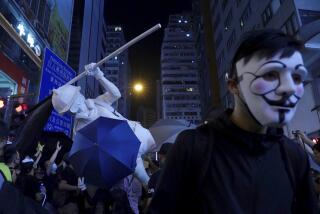Hong Kong Warns Against Speculation
- Share via
The analyst for Soros Fund Management thought he was simply making a routine stop at the offices of the Hong Kong government last month. Instead, he got an earful from the colony’s economic strategists.
The Hong Kong government made it clear that Donald Tsang, its economic leader, was prepared to make use of a powerful arsenal of weapons--including a $60-billion foreign reserve fund--to protect its dollar against speculators such as the legendary George Soros who have made billions of dollars playing currency markets around the world.
That frank disclosure of Hong Kong’s plan to defend its currency reflects a stepped-up campaign to convince the world that Asia’s most vibrant financial center will survive the jitters surrounding the reversion to Chinese control that will happen next July.
In an interview in Los Angeles on Friday, Tsang, Hong Kong’s financial secretary, repeated his warning that speculators were not welcome in his territory.
“Whoever tries to speculate against the Hong Kong dollar will certainly get burned,” Tsang declared. “Whoever does try to do this, I’m going to burn him and burn his bankers together.”
Tsang, en route to a World Bank meeting in Washington, D.C., added that the Hong Kong dollar is the “strongest currency in the world,” backed by financial reserves equal to five times the territory’s money supply.
Nerves in the colony have been on edge since a published report in August claimed Soros had made a $2-billion bet that the Hong Kong dollar would fall. A spokesman for Soros denied it, but Hong Kong officials have been speaking out ever since.
Some fear the Hong Kong government’s tough talk could backfire, causing even greater anxieties about the vulnerabilities of the Hong Kong economy.
“If the chairman of the Federal Reserve Board, Alan Greenspan, for example, stood in a public forum and specifically singled out a media article for criticism because it speculated about the future of the U.S. currency, alarm bells would ring,” Ian Perkin, chief economist with the Hong Kong General Chamber of Commerce, wrote recently.
Under the “one country, two systems” policy agreed to by China, Hong Kong’s financial and political system will operate untouched for at least 50 years after it becomes a part of the world’s largest Communist country on July 1, 1997.
The continued vitality of its economy suggests a high level of confidence that Hong Kong, home of the world’s eighth-largest stock market and of the busiest container port, will remain a major commercial center. A recent survey by the American Chamber of Commerce showed that 91% of its members plan to stay in Hong Kong and that more than half are going to expand their businesses.
But the skepticism surrounding the Chinese government’s hands-off promise and the uncertainty created by the mere logistics of the transfer are still sending ripples through the Hong Kong economy.
Some of the first places to feel political uncertainty are the financial markets, which routinely translate rumor and speculation into million-dollar wins and losses.
Under the linked-rate system adopted by the Hong Kong government in 1983, the Hong Kong government is supposed to hold the equivalent of at least 1 U.S. dollar for every 7.8 Hong Kong dollars in circulation. In reality, however, the government maintains five times that many.
That creates a self-regulating mechanism within the economy. If there is an outflow of money, for example, there is a contraction in the money supply and interest rates will increase. That is designed to attract money back into the system.
Its peg to the U.S. dollar combined with the huge reserve has made the Hong Kong dollar a tough target for speculators.
“A lot of foreign currency traders have lost a lot of money” betting against the Hong Kong dollar, said Orlando Loera, executive vice president of Bank of America’s International Trade Bank.
But the speculative attack that occurred on several Asia currencies--including the Hong Kong dollar--after last January’s Mexican peso crisis is a reminder of the vulnerabilities of an open economy.
Clearly the Hong Kong government’s most powerful weapon is its foreign reserves, which it can draw upon to defend its currency. In addition, the Hong Kong government this year signed an agreement with other Asian central banks to intervene in foreign-currency markets in the event of a short-term crisis.
And top Chinese officials, whose government has nearly $100 billion in reserves at its disposal, have repeatedly stated that they want to see the Hong Kong dollar maintained at its present level.
But in the end, this debate, like most surrounding the 1997 transition, hinges on the unanswerable: whether China will honor its commitment to keep its hands off the Hong Kong economy for at least 50 years.
Tsang argues that China’s leaders will not jeopardize their huge economic investment in Hong Kong and the loss of face that would accompany a botched transfer of power.
But Milton Friedman, the influential free-market theorist, isn’t convinced that even the best-intentioned Chinese officials will be able to resist dipping into Hong Kong’s deep-bottomed well after next year. And that, he argues, will be the beginning of the end of Hong Kong’s financial preeminence.
“The plain fact is, the people who run China don’t understand how the market system will work,” he said. “They will believe they are preserving the Hong Kong dollar and at the same time be taking measures to destroy it.”
Exactly how, or when, the Chinese might start tinkering with Hong Kong’s economy would depend on many things, from domestic politics to the health of the global economy. For example, Friedman speculated, the Chinese might decide to maintain a much smaller foreign reserve in Hong Kong and redirect some of those U.S. dollars into Chinese government bonds.
More to Read
Sign up for Essential California
The most important California stories and recommendations in your inbox every morning.
You may occasionally receive promotional content from the Los Angeles Times.













